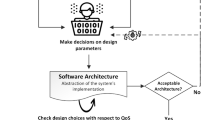Abstract
The design of modern real-time systems not only needs to guarantee their timing correctness, but also involves other critical metrics such as control quality and energy consumption. As real-time systems become increasingly complex, there is an urgent need for efficient optimization techniques that can handle large-scale systems. However, the complexity of schedulability analysis often makes it difficult to be directly incorporated in standard optimization frameworks, and inefficient to be checked against a large number of candidate solutions. In this paper, we propose a novel optimization framework for the design of real-time systems. It leverages the sustainability of schedulability analysis that is applicable for a large class of real-time systems. It builds a counterexample-guided iterative procedure to efficiently learn from an unschedulable solution and rule out many similar ones. Compared to the state-of-the-art, the proposed framework may be ten times faster while providing solutions with the same quality. This work is a journal extension to the conference paper published at RTSS 2020, which adds new discussions for techniques that improve the algorithm scalability, as well as a set of new experiments to better evaluate the proposed framework.













Similar content being viewed by others
Notes
For simplicity we call such a schedulability analysis sustainable, but it is termed as self-sustainable analysis in Baker and Baruah (2009), see a detailed discussion therein.
The only known exception is the MILP solver CPLEX (International Business Machines Corporation xxxx), which provides an interface for building customized branching tree. But the price is that it can no longer run in parallel on multiple cores, which actually makes the whole procedure slower.
References
Al-Bayati Z, Sun Y, Zeng H, Di Natale M (2015) Zhu, Q., Meyer, B.: Task placement and selection of data consistency mechanisms for real-time multicore applications. In: IEEE Real-Time and Embedded Technology and Applications Symposium, pp. 172–181. IEEE
Audsley N (2001) On priority assignment in fixed priority scheduling. Informat Proc Lett 79(1):39–44
Audsley NC, Burns A, Richardson MF, Wellings AJ (1991) in proc. ieee workshop on real-time operating systems and software. In: real-time scheduling: the deadline-monotonic approach, pp. 133–137
Baker T, Baruah S (2009) Sustainable multiprocessor scheduling of sporadic task systems. In: Euromicro Conference on Real-Time Systems
Bambagini M, Marinoni M, Aydin H, Buttazzo G (2016) Energy-aware scheduling for real-time systems: a survey. ACM Transact Embedded Comput Sys (TECS) 15(1):1–34
Bansal S, Zhao Y, Zeng H, Yang K (2018) Optimal implementation of simulink models on multicore architectures with partitioned fixed priority scheduling. In: IEEE Real-Time Systems Symposium, pp. 242–253. IEEE
Baruah S, Burns A (2006) Sustainable scheduling analysis. In: 27th IEEE Real-Time Systems Symposium
Baruah S, Burns A, Davis R (2011) Response-time analysis for mixed criticality systems. In: IEEE Real-Time Systems Symposium
Bate I, Emberson P (2006) Incorporating scenarios and heuristics to improve flexibility in real-time embedded systems. In: IEEE Real-Time and Embedded Technology and Applications Symposium
Bini E, Di Natale M (2005) Optimal task rate selection in fixed priority systems. In: 26th IEEE Real-Time Systems Symposium
Boyd S, Vandenberghe L (2004) Convex optimization. Cambridge University Press, Cambridge
Davare A, Zhu Q, Di Natale M. Pinello C, Kanajan S (2007) Sangiovanni-Vincentelli, A.: Period optimization for hard real-time distributed automotive systems. In: ACM/IEEE Design Automation Conference
Davare A, Zhu Q, Di Natale M, Pinello C, Kanajan S, Sangiovanni-Vincentelli A (2007) Period optimization for hard real-time distributed automotive systems. In: Design Automation Conference
Davis R, Burns A (2009) Priority assignment for global fixed priority pre-emptive scheduling in multiprocessor real-time systems. In: 30th IEEE Real-Time Systems Symposium
Davis RI, Cucu-Grosjean L, Bertogna M, Burns A (2016) A review of priority assignment in real-time systems. J Sys Architec 65:64–82
Ebert C, Favaro J (2017) Automotive software. IEEE Soft 34(3):33–39
Ekberg P, Yi W (2015) Uniprocessor feasibility of sporadic tasks with constrained deadlines is strongly conp-complete. In: 27th Euromicro Conference on Real-Time Systems, pp. 281–286
Ekberg P, Yi W (2017) Fixed-priority schedulability of sporadic tasks on uniprocessors is np-hard. In: IEEE Real-Time Systems Symposium
Ferrari A, Di Natale M, Gentile G, Reggiani G, Gai P (2009) Time and memory tradeoffs in the implementation of autosar components. In: 2009 Design, Automation & Test in Europe Conference & Exhibition, pp. 864–869. IEEE
Gu Z, Han G, Zeng H, Zhao Q (2016) Security-aware mapping and scheduling with hardware co-processors for flexray-based distributed embedded systems. IEEE Transac Parallel Distributed Sys 27(10):3044–3057
Guo Z, Sruti S, Ward BC, Baruah S (2017) Sustainability in mixed-criticality scheduling. In: IEEE Real-Time Systems Symposium
Hamann A, Jersak M, Richter K, Ernst R (2004) Design space exploration and system optimization with symta/s - symbolic timing analysis for systems. In: IEEE Real-Time Systems Symposium
Han G, Zeng H, Di Natale M, Liu X, Dou W (2013) Experimental evaluation and selection of data consistency mechanisms for hard real-time applications on multicore platforms. IEEE Transac Indus Informat 10(2):903–918
Hassanalian M, Abdelkefi A (2017) Classifications, applications, and design challenges of drones: A review. Prog Aerospace Sci 91:99–131
Huang P, Giannopoulou G, Stoimenov N, Thiele L (2014) Service adaptions for mixed-criticality systems. In: IEEE Asia and South Pacific Design Automation Conference
Huang P, Kumar P, Giannopoulou G, Thiele L (2014) Energy efficient dvfs scheduling for mixed-criticality systems. In: ACM Conference on Embedded Software
International Business Machines Corporation: CPLEX Optimizer
Liu CL, Layland JW (1973) Scheduling algorithms for multiprogramming in a hard-real-time environment. J. ACM 20(1):46–61. https://doi.org/10.1145/321738.321743
Löfberg J (2004) Yalmip : A toolbox for modeling and optimization in matlab. In: IEEE Symposium on Computer Aided Control Systems Design
Mancuso G, Bini E, Pannocchia G (2014) Optimal priority assignment to control tasks. ACM Trans Embedded Comput Syst 13(5s):161
Mutapcic A, Koh K, Kim S, Boyd S (2006) Ggplab version 1.00: a matlab toolbox for geometric programming
Nelson A, Moreira O, Molnos A, Stuijk S, Nguyen BT, Goossens K (2011) Power minimisation for real-time dataflow applications. In: Euromicro Conference on Digital System Design
Pagani S, Chen JJ (2014) Energy efficiency analysis for the single frequency approximation (sfa) scheme. ACM Transact Embedded Comput Syst (TECS) 13(5s):158
Saksena M, Wang Y (2000) Scalable real-time system design using preemption thresholds. In: IEEE Real-Time Systems Symposium
Seto D, Lehoczky JP, Sha L (1998) Task period selection and schedulability in real-time systems. In: 19th IEEE Real-Time Systems Symposium
Shin M, Sunwoo M (2007) Optimal period and priority assignment for a networked control system scheduled by a fixed priority scheduling system. Int J Automotive Technol 8:39–48
Tindell K, Burns A, Wellings A (1992) Allocating hard real-time tasks: An np-hard problem made easy. Real-Time Syst. 4(2):145–165
Tripakis S, Lublinerman R (2018) Modular code generation from synchronous block diagrams: Interfaces, abstraction, compositionality. In: Principles of Modeling, pp. 449–477. Springer
Wang C, Gu Z, Zeng H (2016) Global fixed priority scheduling with preemption threshold: Schedulability analysis and stack size minimization. IEEE Trans. Parallel and Distributed Sys 27(11):3242–3255
Wang Y, Saksena M (1999) Scheduling fixed-priority tasks with preemption threshold. In: International Conference on Real-Time Computing Systems and Applications
Zeng, H., Di Natale, M.: Mechanisms for guaranteeing data consistency and flow preservation in autosar software on multi-core platforms. In: IEEE Symposium on Industrial and Embedded Systems (2011)
Zeng H, Di Natale M (2012) Efficient implementation of autosar components with minimal memory usage. In: 7th IEEE Symposium on Industrial Embedded Systems
Zhao Y, Gala V, Zeng H (2018) A unified framework for period and priority optimization in distributed hard real-time systems. IEEE Transactions on Computer-Aided Design of Integrated Circuits and Systems 37(11):2188–2199
Zhao Y, Zeng H (2017) The concept of unschedulability core for optimizing priority assignment in real-time systems. In: Conference on Design, Automation and Test in Europe
Zhao Y, Zeng H (2017) The virtual deadline based optimization algorithm for priority assignment in fixed-priority scheduling. In: IEEE Real-Time Systems Symposium
Zhao Y, Zeng H (2018) The concept of response time estimation range for optimizing systems scheduled with fixed priority. In: IEEE Real-Time and Embedded Technology and Applications Symposium (2018)
Zhao Y, Zeng H (2018) The concept of unschedulability core for optimizing real-time systems with fixed-priority scheduling. IEEE Transact Comput 68(6):926–938
Zhao Y, Zeng H (2019) The concept of maximal unschedulable deadline assignment for optimization in fixed-priority scheduled real-time systems. Real-Time Syst 55(3):667–707
Zhao Y, Zhou R, Zeng H (2020) An optimization framework for real-time systems with sustainable schedulability analysis. In: 2020 IEEE Real-Time Systems Symposium (RTSS), pp. 333–344. IEEE
Acknowledgements
This work is partially funded by NSF Grants No. 1812963 and No. 1837519.
Author information
Authors and Affiliations
Corresponding author
Additional information
Publisher's Note
Springer Nature remains neutral with regard to jurisdictional claims in published maps and institutional affiliations.
Rights and permissions
Springer Nature or its licensor holds exclusive rights to this article under a publishing agreement with the author(s) or other rightsholder(s); author self-archiving of the accepted manuscript version of this article is solely governed by the terms of such publishing agreement and applicable law.
About this article
Cite this article
Zhao, Y., Zhou, R. & Zeng, H. Design optimization for real-time systems with sustainable schedulability analysis. Real-Time Syst 58, 275–312 (2022). https://doi.org/10.1007/s11241-022-09388-5
Accepted:
Published:
Issue Date:
DOI: https://doi.org/10.1007/s11241-022-09388-5




